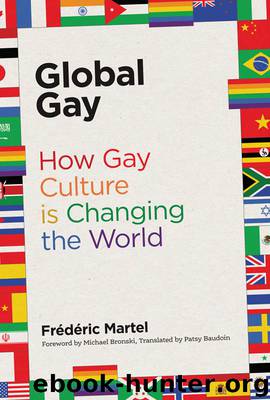Global Gay: How Gay Culture Is Changing the World by Frédéric Martel & Patsy Baudoin

Author:Frédéric Martel & Patsy Baudoin
Language: eng
Format: epub
Tags: homosexuality; queer studies; homophobia; homophobes; LGBT; globalization; gay rights; sexuality; gay liberation; gay pride; gay marriage; same-sex marriage; sexual orientation; homosexual; anti-gay; anti-homosexual; human rights; gay bars; LGBT issues; Stonewall; tolerance; civil unions; gay revolution; cruising; gay Muslims; state censorship; gay activists; LGBT activists; gay activism; LGBT activism; gay cafe; gay neighborhood; gayborhoods;
Publisher: The MIT Press
Published: 2018-04-27T00:00:00+00:00
6 The Battle at the United Nations
Edwin Cameron searches through the drawers of his huge desk. He opens some closets between dozens of legal code and case law books. He remembers storing copies of the South African Constitution. He isn’t finding them. “You absolutely have to have the real thing, not just a copy,” he insists. He sends for his secretary and his assistant and speaks to them with great kindness. Everyone starts looking for these constitutional texts. And suddenly they find the precious documents: small purple books, 460 pages long, in a pile and still wrapped in cellophane. Edwin Cameron gently unfolds one of these books and opens it to the second chapter, the Universal Declaration of Human Rights, and reads Section 9, “Equality,” to me: “Everyone is equal before the law and has the right to equal protection and benefit of the law.” What follows are several causes of discrimination expressly prohibited by the state, including race, gender, sex, skin color, and sexual orientation. Cameron repeats: “Sexual orientation.” This is the first time ever in the world that a constitution has included this protection. South Africa is ahead of its time. Thanks to Justice Cameron.
The Constitutional Court of South Africa is located on the very site of a former famous prison during apartheid: Old Fort Number Four. Nelson Mandela was imprisoned there twice, and I visit the tiny, spartan cells, which have been preserved. Some are no bigger than a broom closet. This symbol of the pain and suffering of political prisoners has become the site of justice par excellence. At the entrance to the court, I notice a huge photograph: a gay couple who got the right to marry.
At age sixty-three, Edwin Cameron has an impressive physique and elegance. Simple, prim, he stands more than six feet four inches tall. He was born into a white family in Pretoria, half-Afrikaner on his mother’s side and half-Scottish on his father’s. “It was a very poor, working-class, uneducated family. His father was an alcoholic who had done time in prison. Very young, Edwin had to meet his parents’ needs,” Timothy Trengove-Jones, Cameron’s best friend, tells me. Despite such humble origins, Edwin Cameron was a brilliant pupil in school. He wanted to study law and was accepted to Oxford. There, far from Africa, the young Edwin proved exceptionally gifted; he left Oxford showered with diplomas, both a lawyer and a law professor. His destiny was totally mapped out: he would perform in London, among the greatest, be a “barrister,” he who signs the grand arguments and leaves his name attached to important case law. Except that Cameron hated the rigidity of British society, the pretentions of the British elite, and the refined narrow-mindedness of small little England, its airs and its polished language. He wanted to escape from Europe’s social and cultural hierarchies. He went home to Africa.
“For me, South Africa is a dry winter in July and the smell of the brown, dry grass of summer in December. I love my country,” Cameron tells me.
Download
This site does not store any files on its server. We only index and link to content provided by other sites. Please contact the content providers to delete copyright contents if any and email us, we'll remove relevant links or contents immediately.
| African-American Studies | Asian American Studies |
| Disabled | Ethnic Studies |
| Hispanic American Studies | LGBT |
| Minority Studies | Native American Studies |
Cecilia; Or, Memoirs of an Heiress — Volume 1 by Fanny Burney(31447)
Cecilia; Or, Memoirs of an Heiress — Volume 3 by Fanny Burney(31037)
Cecilia; Or, Memoirs of an Heiress — Volume 2 by Fanny Burney(30985)
The Great Music City by Andrea Baker(23036)
We're Going to Need More Wine by Gabrielle Union(18127)
Bombshells: Glamour Girls of a Lifetime by Sullivan Steve(13159)
Pimp by Iceberg Slim(13000)
All the Missing Girls by Megan Miranda(12841)
Fifty Shades Freed by E L James(12492)
Talking to Strangers by Malcolm Gladwell(11991)
Norse Mythology by Gaiman Neil(11964)
Crazy Rich Asians by Kevin Kwan(8413)
Mindhunter: Inside the FBI's Elite Serial Crime Unit by John E. Douglas & Mark Olshaker(7899)
The Lost Art of Listening by Michael P. Nichols(6534)
Enlightenment Now: The Case for Reason, Science, Humanism, and Progress by Steven Pinker(6449)
Bad Blood by John Carreyrou(5816)
The Four Agreements by Don Miguel Ruiz(5578)
Weapons of Math Destruction by Cathy O'Neil(5097)
We Need to Talk by Celeste Headlee(4922)
